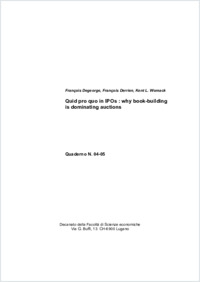Quid pro quo in IPOs : why book-building is dominating auctions
- Degeorge, François Istituto di finanza (IFin), Facoltà di scienze economiche, Università della Svizzera italiana, Svizzera
- Derrien, François Istituto di finanza (IFin), Facoltà di scienze economiche, Università della Svizzera italiana, Svizzera
- Womack, Kent L. Istituto di finanza (IFin), Facoltà di scienze economiche, Università della Svizzera italiana, Svizzera
-
2004
49 p
English
The book-building procedure for selling initial public offerings to investors hascaptured significant market share from auction alternatives in recent years, despite significantly lower costs in both direct fees and initial underpricing when using the auction mechanism. This paper shows that in the French market, where the frequency of book-building and auctions was about equal in the 1990s, the ostensible advantages to the issuer using book-building were advertising-related quid pro quo benefits. Specifically, we find that book-built issues were more likely to be followed and positively recommended by the lead underwriters and were also more likely to receive “booster shots” post issuance if the shares had fallen. Even non-underwriters’ analysts appear to promote book-built issues more, but only when their underwriters stood to gain from acquiring shares in future issues from the recommended firm’s lead underwriter. Bookbuilt issues also appeared to garner more press in general (but only after they had chosen book-building, not before). Yet, we do not observe valuation or return differentials to suggest that these types of promotion have any value to the issuing firm. We conclude that underwriters using the book-building procedure have convinced issuers of the questionable value of advertising and promotion of their shares.
- Language
-
- English
- Classification
- Economics
- License
-
License undefined
- Open access status
- green
- Identifiers
-
- RERO DOC 5200
- ARK ark:/12658/srd1318096
- Persistent URL
- https://n2t.net/ark:/12658/srd1318096
Statistics
Document views: 215
File downloads:
- Texte intégral: 315
